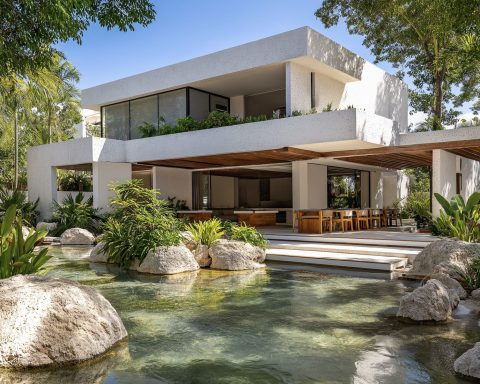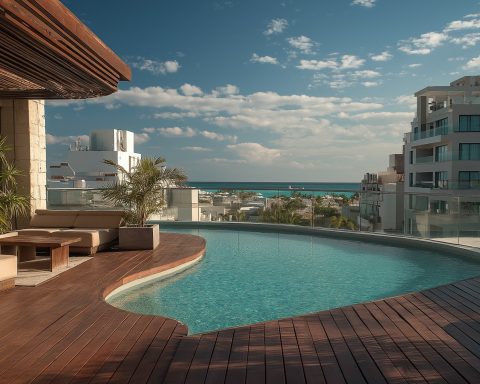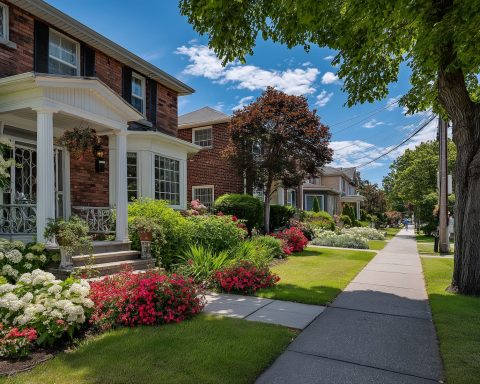Key Facts
- United States: Home prices are now lagging inflation for the first time in years, diminishing housing’s wealth-building power benzinga.com. Mortgage rates ticked down in late August, offering slight relief fortune.com. Analysts predict a second-half rebound led by Florida and Texas devere-group.com, with Fed rate cuts expected to catalyze a new upturn devere-group.com.
- Europe: British house prices fell in August for the first time in months (–0.1% MoM), defying forecasts and reflecting stretched affordability reuters.com reuters.com. The Bank of England’s recent rate cut to 4.0% eased pressure reuters.com, but high mortgage costs still weigh on buyers. In Central Europe, a major landlord’s earnings surged on stabilizing values property-forum.eu, hinting the worst may be over for commercial markets.
- Asia-Pacific: China’s property slump deepened, with August new-home sales by top developers down ~18% year-on-year bloomberg.com despite stimulus measures. Conversely, Australia’s housing boomed – prices jumped 0.7% in August, the fastest since 2024 reuters.com, as rate cuts and tight supply fueled buying reuters.com reuters.com.
- Middle East: Gulf real estate stays hot. Dubai saw record transaction volumes in mid-2025 despite a brief off-plan sales dip after last year’s boom thenationalnews.com thenationalnews.com. Experts remain optimistic that major project delays will be avoided thenationalnews.com thenationalnews.com. A massive pipeline of new homes (40,000 in 2025) could moderate prices, but global investors continue to flock to the UAE’s “booming” market thenationalnews.com thenationalnews.com.
- Africa: South Africa’s property sector sends mixed signals. The value of building plans approved fell ~3% in H1 2025 vs. last year iol.co.za, suggesting developer caution, yet completed building values actually rose 3% iol.co.za. Construction tenders showed a mid-year rebound (July tenders +53% YoY) after a prolonged slump iol.co.za, indicating renewed investment in infrastructure.
- Latin America: Housing prices are surging in Brazil – July’s 0.58% monthly rise was nearly double inflation riotimesonline.com, with values up ~8% on the year riotimesonline.com. Even with sky-high interest rates (~14.75%), buyer demand for smaller, affordable units remains intense riotimesonline.com. Meanwhile, wealthy Latin American investors are snapping up Miami real estate as a safe haven; nearly half of new Miami homes now sell to foreign buyers – 86% of them from Latin America worldredeye.com worldredeye.com.
North America
The U.S. real estate market is at a turning point. Home prices have essentially stopped outpacing inflation, eroding the hefty wealth gains owners enjoyed in recent years benzinga.com benzinga.com. In fact, S&P Dow Jones Indices data showed prices nationally fell 0.3% from May to June – the fourth monthly decline – even as consumer prices rose ~2.7% benzinga.com. “For the first time in years, home prices are failing to keep pace with broader inflation,” noted Nicholas Godec of S&P Dow Jones Indices benzinga.com. This marks a historic shift from the double-digit yearly appreciation of the pandemic era to a cooler “inflation-parity” phase benzinga.com. High mortgage rates – still around 6.5% for 30-year loans in early September fortune.com – and economic uncertainty have left the housing market “stuck,” with both buyers and sellers holding back.
Regional divides are growing sharper. An August Realtor.com report found home prices under pressure in the Sun Belt (e.g. San Antonio, Denver), where listings have swelled, even as values continue rising in supply-starved markets like New York City devere-group.com devere-group.com. “When you have fewer homes for sale…that’s going to put upward pressure on prices or prevent them from falling” in those tight markets, explained Realtor.com economist Jake Krimmel devere-group.com. In contrast, parts of Texas and the Southwest that boomed post-2020 are now seeing price corrections, after a pandemic migration surge faded devere-group.com devere-group.com.
Despite these headwinds, industry sentiment is brightening. Analysts at PwC predict a “modest recovery” in U.S. real estate in H2 2025, declaring the sector “on the cusp of the next upturn” with 2–3 years of growth ahead devere-group.com devere-group.com. The Emerging Trends survey named Dallas, Miami and Houston the top property prospects for investors, as Florida and Texas are poised to come “roaring back” from their recent lulls devere-group.com devere-group.com. A remarkable 65% of real estate professionals now rate their firm’s outlook as good/excellent, up from just 41% a year ago devere-group.com. The anticipated catalyst? The U.S. Federal Reserve is widely expected to cut interest rates at its September meeting – a move that could “energize” demand by lowering financing costs devere-group.com.
On the commercial side, opportunities are shifting. With office vacancies high post-COVID, investors are eyeing niche sectors like data centers, senior living, and affordable rentals devere-group.com. J.P. Morgan analysts concur that “multifamily, retail and industrial sectors remain resilient” even in a high-rate environment devere-group.com. Notably, retail properties have become a surprise standout: U.S. retail real estate sales jumped over 20% in recent months even as overall commercial deal volume stayed tepid credaily.com. And in a bullish signal for pricing, one index showed commercial property values rising in August for the first time in five months costar.com, hinting that the market may be finding a floor after a year of softening values.
Canada: North of the border, a different story is unfolding in the condominium market. After a prolonged boom, Canada’s condo sector is hitting the brakes, raising doubts about its once rock-solid investment appeal. In Toronto – a city where nearly 39% of condos were investor-owned as of 2022 – inventory has ballooned and sales have plunged. A July study showed new condo sales in Greater Toronto down 69% year-on-year, sending unsold units to record highs globalnews.ca. “Experts warn that the condo crash makes these units a bad investment — especially if you’re planning to use them as a nest egg,” reports Global News globalnews.ca. In a recent survey, 57% of Canadians said they would not buy a condo at all now, and only 11% would consider one as an investment globalnews.ca. With higher interest rates and abundant supply, some condo sellers may even face losing money on units bought at the peak, analysts caution globalnews.ca. The weakness in condos has left many would-be move-up buyers “kind of stuck” – unable to sell small units or afford houses – illustrating how rising rates and shifting preferences (toward larger homes) have disrupted Canada’s urban housing equation.
Europe
Europe’s property markets are navigating a challenging landscape of rising financing costs and policy changes, with clear contrasts between countries. In the UK, new data delivered a surprise: house prices fell in August for the first time since spring reuters.com. Nationwide Building Society reported a 0.1% decline from July, versus economists’ predictions of a modest rise reuters.com. Annual price growth slumped to just 2.1%, the weakest in over a year reuters.com. The culprit is affordability. “The relatively subdued pace of house price growth is understandable, given that affordability remains stretched relative to long-term norms,” said Robert Gardner, Nationwide’s chief economist reuters.com. Even after a small Bank of England rate cut in early August, the average buyer faces a punishing mortgage burden – about 35% of take-home pay for a first-time buyer’s loan, well above the historic norm of ~30% reuters.com reuters.com. Would-be buyers are also skittish over potential tax changes: the Royal Institution of Chartered Surveyors noted that talk of new property taxes (like a possible “mansion tax”) in the upcoming Budget has sapped momentum from what was a budding spring recovery reuters.com reuters.com. As one economist warned, speculation about tax hikes “hits buyer sentiment” and could further chill the market reuters.com.
On the continent, mixed signals abound. In Germany and France, housing markets are softening under the weight of record-high interest rates from the European Central Bank. Yet parts of Central and Eastern Europe are seeing glimmers of stabilization. A mid-year earnings report from CPI Property Group – a major commercial landlord across CEE – revealed that property values may have hit bottom. The firm posted a €211 million net profit in H1 2025, a sharp turnaround from just €43 million a year earlier property-forum.eu. The rebound was driven largely by a €130 million positive property revaluation, which the company said “reflected market stabilisation” in its portfolio property-forum.eu. In other words, after a turbulent 2024, office and retail assets in the region are no longer rapidly losing value. However, rental income for CPI dipped ~4% as the firm sold off non-core properties property-forum.eu – indicating investors are still consolidating and de-risking.
In Europe’s real estate investment scene, activity continues despite caution. One notable development: CPI Europe (a new spin-off of CPI) has signed a deal to acquire a large residential portfolio in the Czech Republic property-forum.eu, as part of a strategic shift to broaden beyond offices and malls. And in Poland – one of Europe’s fastest-growing markets – logistics real estate remains a bright spot. A Savills report highlighted record demand for warehouse space around Warsaw and other hubs in H1 2025, with vacancy rates actually falling and prime rents holding firm property-forum.eu property-forum.eu. This suggests that while housing markets cool, the industrial and logistics sector in Europe is still thriving on the back of e-commerce and reconfigured supply chains.
Policy moves are also shaping Europe’s property outlook. In Hungary, authorities are embracing digital transformation: on September 1, the government launched a new Electronic Real Estate Registry (E-ING) to replace paper-based land records property-forum.eu. This sweeping reform is expected to “streamline and speed up” all property transactions, reducing bureaucracy and costs property-forum.eu. The timing, however, coincided with the start of a major state-subsidized housing loan program, and officials warned the overlap could briefly slow registration of new mortgages property-forum.eu. Such modernization efforts, alongside cross-border investments and shifting tax policies, underscore how Europe’s property sector is adapting to a post-boom era – with an eye on efficiency and stability after years of rapid growth.
Asia-Pacific
China’s real estate woes remain a central global concern. Through August, the world’s second-largest property market showed little sign of bottoming out. China’s home sales extended their slump, dropping for a sixth straight month bloomberg.com. Preliminary data from China Real Estate Information Corp. revealed that the top 100 developers sold about ¥207 billion in new homes in August – down 17.6% from a year earlier bloomberg.com. This followed an even sharper 24% plunge in July bloomberg.com. Prices continue to slide as well bloomberg.com. All of this is despite Chinese authorities rolling out stimulus measures in major cities to try to spark buying bloomberg.com. The protracted downturn has broad implications: it’s crimping consumer spending and confidence. Mortgage demand has dried up – new mortgage lending in July actually shrank year-on-year for the first time in two decades reuters.com – reflecting households’ reluctance to take on property debt in an uncertain market. As one economist noted, China’s economy is being dragged by “persistently weak domestic demand and a cooling property market,” putting Beijing’s 5% growth target at risk reuters.com reuters.com. The crisis enveloping developers like Evergrande and Country Garden has reached a critical phase; Evergrande, the world’s most indebted developer, was delisted from the Hong Kong stock exchange in late August, marking a symbolic end to its saga reuters.com. Country Garden, once China’s largest builder, is scrambling to restructure $14 billion in offshore debt to avoid default reuters.com reuters.com. In short, China’s real estate slump has become a grinding, structural correction – one that authorities are attempting to manage with targeted policy tweaks, such as lowering some down-payment requirements and interest rates, but with only modest effects so far.
Elsewhere in Asia, however, property markets are more upbeat. Australia is in the midst of a housing rebound that has surprised many observers. In August, home prices across Australian capitals rose another 0.7% from the month prior – the strongest gain in over a year reuters.com reuters.com. The upswing has been “broad-based,” according to property consultant Cotality (formerly CoreLogic), with Brisbane leading at +1.2%, Sydney up 0.8%, and Melbourne +0.3% reuters.com. Only one small city (Hobart) saw a minor dip reuters.com. What’s driving the rally is a classic case of demand vastly outstripping supply. “Once again we are seeing a clear mismatch between available supply and demonstrated demand placing upwards pressure on housing values,” said Tim Lawless, Cotality’s research director reuters.com. Buyer confidence has returned thanks to a combination of factors: incomes are finally rising in real terms, consumer sentiment is improving, and crucially, borrowing capacity has increased as interest rates come down reuters.com. Indeed, the Reserve Bank of Australia cut interest rates for the third time this year in August, after inflation showed signs of cooling reuters.com. With the benchmark rate now down several notches from its peak, Australians have felt a renewed “sense of urgency” to buy before prices climb further reuters.com. The result: national home values have been “gradually building momentum” since the RBA’s easing cycle began in February reuters.com, reversing the slight correction seen in 2024.
Other parts of Asia-Pacific also offer positive news. In Japan, commercial real estate investment has picked up in anticipation of potential Bank of Japan policy shifts, and the residential market remains tight in major cities. New Zealand made headlines on September 1 by re-opening its housing market to foreign buyers (with certain investment conditions) reuters.com, reversing a ban as the government seeks to attract capital and prop up construction. And in Southeast Asia, markets like Singapore and Vietnam are balancing cooling measures against still-robust demand. Overall, Asia-Pacific’s real estate story is a tale of two tracks: China’s deep correction versus resilience and recovery elsewhere. As Goldman Sachs analysts put it in a recent note, strength in places like Australia may “offset, but not entirely erase” the drag from China on the region’s property sector – meaning global investors remain cautiously optimistic on Asia-Pacific real estate, ex-China.
Middle East
The Middle East’s property markets – especially the Gulf region – continue to defy gravity with strong growth, even as global real estate cools. In the United Arab Emirates, a construction and investment boom shows little sign of slowing. Dubai’s residential market was remarkably resilient through the first half of 2025 thenationalnews.com. Although sales of off-plan (pre-construction) properties dipped slightly after a frenzy late last year, they still accounted for over 70% of all home sales – a dominant share thenationalnews.com. In fact, Q2 saw both off-plan and ready home sales hit record-breaking volumes, as momentum rebounded strongly thenationalnews.com thenationalnews.com. “Given the robust performance of the off-plan segment…developers are expected to capitalize on momentum,” a Cavendish Maxwell report noted, suggesting total transactions in 2025 could reach new highs if developers launch more projects in H2 thenationalnews.com thenationalnews.com.
One concern in the UAE has been whether the red-hot development pipeline might lead to project delays or an oversupply. Industry experts acknowledge that Dubai is in the midst of a housebuilding boom and that delivery delays are “common” – but they maintain the situation is manageable thenationalnews.com thenationalnews.com. “We do not anticipate major delays at present,” said Usman Adrees, head of primary markets at Engel & Völkers Middle East, noting that reputable developers have strong incentives to deliver on time to protect their brand and cash flow thenationalnews.com thenationalnews.com. With an unprecedented 40,000 new units slated for completion this year and another 60,000 in 2026, some moderation of price growth is expected as more supply hits the market thenationalnews.com thenationalnews.com. Matthew Green, head of research at CBRE MENA, commented that with this “larger pipeline of deliveries than ever seen before… at some point, declines may follow, as is normal in any property cycle” – yet he quickly added that “Dubai has built an ecosystem and a brand which investors want to be part of”, ensuring continued demand thenationalnews.com. In other words, even if the pace of price increases cools, the city’s international appeal and population growth should support the market. Indeed, Dubai remains a magnet for global wealth: it led the world for prime property price growth in 2023, and its status as a safe haven has only strengthened amid geopolitical uncertainty.
Elsewhere in the Middle East, institutional investments and developments are robust. Saudi Arabia and Qatar are pouring billions into new city projects and infrastructure ahead of major events (like Saudi’s planned Neom city and Qatar’s post-World Cup initiatives). In Saudi Arabia, for example, Riyadh’s iconic Kingdom Tower is now managed via advanced tech platforms as developers modernize operations prnewswire.com. Cross-border investors from the Gulf are also active abroad, snapping up trophy assets in Europe and Asia as part of diversification strategies. Within the region, Abu Dhabi is hosting its premier international real estate showcase this fall gulfnews.com, highlighting opportunities for foreign investors in Middle East property.
A noteworthy trend is Middle Eastern capital seeking value in Western markets, while conversely, global firms are upping their presence in the Gulf. For instance, luxury developer Manova Partners just announced its first European acquisition – an office building in Warsaw – as Gulf investors expand globally property-forum.eu. Meanwhile, Western real estate brokerages and consultancies are beefing up teams in Dubai and Riyadh, aiming to ride the boom. The net effect is a highly dynamic Middle Eastern real estate landscape: domestically booming, internationally influential, and increasingly professionalized. Barring an external shock (or a drastic oil price downturn that hits local liquidity), the region’s property markets are expected to finish 2025 on a high note, buoyed by economic growth, pro-investor policies, and sustained buyer demand both local and foreign.
Africa
Across Africa, real estate trends vary widely, but a common theme is the effort to balance growth with affordability amid economic challenges. In South Africa, the continent’s most developed property market, conditions are lukewarm. Official data show the value of new building plans approved fell by 3% in the first half of 2025 compared to a year prior iol.co.za. This suggests developers are pulling back slightly, likely due to higher financing costs (South Africa’s prime interest rate sits at 10.75% after a series of hikes) and worries about the economic outlook ooba.co.za. The decline in planned projects was seen in both residential and commercial building categories iol.co.za. However, the construction sector isn’t grinding to a halt – in fact, the value of buildings completed in H1 2025 actually rose about 3.1% year-on-year iol.co.za. In other words, many projects initiated in the last year are coming to fruition, even as fewer new ones enter the pipeline. And there are signs of a potential turnaround: July data showed the first significant uptick in civil construction tenders in over a year, with the value of new government tenders surging 53% from a year earlier iol.co.za. This tender rebound, led by big infrastructure projects in provinces like Mpumalanga and Gauteng, could signal more construction activity ahead if funding follows through iol.co.za. Still, South Africa’s property market faces headwinds from sluggish growth and utility crises; as such, price growth remains modest and highly location-specific, with well-located “semigration” hotspots (e.g. Cape Town) outperforming weaker inland markets.
In other African nations, real estate news from late August includes both large-scale investments and policy shifts. In Nigeria, the continent’s biggest economy, Lagos is gearing up to host a major Pan-African real estate conference in September aimed at attracting foreign investment and showcasing Nigeria’s ambitious mixed-use developments instagram.com. Nigeria and others are also seeing rising interest in affordable housing projects, often backed by public-private partnerships to address huge housing deficits. In Kenya, meanwhile, the government’s push for more affordable homes has led to regulatory changes and new financing models, though high interest rates there (the Central Bank of Kenya’s rate is 10.5%) pose a challenge for buyers.
North African markets like Egypt and Morocco are contending with inflation and currency pressures which have actually driven more investment into property as a hedge. Egypt has aggressively been building its New Administrative Capital and thousands of new housing units, providing a construction-led boost to its economy, though developers are wary of overextending if interest rates remain elevated. Morocco saw a slight dip in property prices earlier in 2025, but demand for rental properties in cities like Casablanca is robust, supported by tourism and expat workers.
One standout on the continent is the luxury segment in certain cities. Cape Town now ranks as Africa’s top luxury real estate market, with the most sales above $1 million, according to Knight Frank facebook.com. South Africa in general leads the continent in high-end property demand, thanks to affluent local and semigrant buyers (including some expatriates returning or investing). This highlights the divergence within African markets: luxury coastal enclaves can boom even as the broader market stays flat.
Overall, Africa’s real estate sector is marked by cautious optimism. Investors see long-term potential in the continent’s young population and urbanization trend – evidenced by forecasts that Africa will have some of the fastest-growing cities (and housing needs) in the world over the next decade. Yet the short-term is tempered by high interest rates, political risk, and currency instability in many countries. Late-summer 2025 news captures this balance: gradual progress on housing and commercial developments, efforts to modernize (e.g. digitizing land registries and streamlining permits), and the constant search for capital to fund Africa’s immense infrastructure and housing requirements.
Latin America
Latin America’s real estate landscape in recent days has been a story of booming demand at home and burgeoning investment abroad. In Brazil, the region’s largest economy, housing prices are on a tear. Fresh data showed that in July 2025, Brazilian home prices rose 0.58% in a single month, according to the widely followed FipeZAP index riotimesonline.com. That may sound modest, but it’s actually faster than Brazil’s inflation for the month, meaning real property values are climbing. Year-on-year, house prices nationally are up nearly 8%, well above the ~5.3% CPI inflation rate riotimesonline.com. This surge comes even as Brazil’s central bank only began cutting its steep interest rates (previously 13.75%) in August. With mortgage rates still very high – the Selic rate was 14.75% until early August riotimesonline.com – one might expect the market to cool. Instead, Brazilian buyers have aggressively sought smaller, more affordable homes, driving transactions up by as much as 40% in big cities like São Paulo as people adjust to high rates by downsizing riotimesonline.com. “Financing has never looked tougher for new buyers,” one Brazilian report observed, yet developers keep launching projects because demand remains unmet riotimesonline.com. The price per square meter in hotspots like Balneário Camboriú now tops R$14,000 (≈$2,500) riotimesonline.com. Analysts warn that if prices keep outpacing incomes, affordability will deteriorate and many families could be priced out of homeownership riotimesonline.com. For now, however, Brazilian real estate appears to be benefiting from a tailwind of pent-up demand, a recovering economy, and the early stages of monetary easing that improve buyer sentiment.
Elsewhere in Latin America, housing markets are mixed but generally active. Mexico has seen solid growth in residential construction, particularly in the suburbs of Mexico City and Monterrey, although high interest rates (Banxico’s rate is 11.25%) have started to pinch middle-class buyers. In Chile, after a soft 2024, lower interest rates and a more stable peso have led to a pickup in home sales this quarter. Chile’s central bank cut rates in July, providing relief to its mortgage market. Colombia is focusing on social housing programs, and while its real estate investment trusts (FIBRAs) have slowed new acquisitions due to financing costs, the long-term housing deficit keeps demand fundamentally strong.
A striking trend is Latin American investors’ impact on overseas real estate – particularly in the United States. South Florida’s property market has been turbocharged by Latin American capital in 2025. According to a new report by the Miami Realtors Association, 49% of new-construction home buyers in Miami over the past 18 months have been foreign, and a staggering 86% of those foreign buyers hail from Latin America worldredeye.com worldredeye.com. Wealthy individuals from countries like Colombia, Mexico, Argentina, and Brazil are funneling money into Miami condos and houses to safeguard their wealth in U.S. dollars amid political and economic instability back home worldredeye.com. They are enticed by discounts on pre-construction deals and the allure of Miami’s familiar culture and stability – the city has a Hispanic-majority population and no state income tax, making it feel like the “Capital of Latin America” for property investors worldredeye.com worldredeye.com. This trend has effectively underpinned Miami’s luxury and new development markets, even as domestic U.S. buyers face affordability issues. As one Miami market observer noted, Latin American buying is a “silent boom” that’s keeping developers busy and price tags high on the best units.
Meanwhile, within Latin America, investor activity and policy changes are noteworthy. In late August, several countries (e.g. Peru, Uruguay) have been discussing reforms to attract more foreign real estate investment – such as easing purchase restrictions and offering residency visas for property buyers. And in Argentina, with inflation raging above 100%, real estate has paradoxically become a refuge for those with dollars: cash transactions for properties in Buenos Aires have ticked up as Argentinians convert volatile pesos into tangible assets. However, Argentina’s market remains weighed down by its broader economic crisis and high borrowing costs, limiting activity mostly to well-heeled cash buyers.
In summary, Latin America’s real estate news at the turn of September 2025 highlights a region of high highs and low lows. On one hand, domestic markets like Brazil are booming against the odds, and Latin investors are making waves abroad. On the other hand, issues of affordability, political risk, and economic volatility continue to challenge sustainable growth. Industry experts across the region are watching central bank decisions closely – further interest rate cuts in Brazil, Chile, or Mexico could prolong the current upswing, while any financial turbulence could quickly dampen confidence. For now, though, the sentiment is largely positive and growth-oriented, capping off late summer with strong momentum in many Latin American property markets.
Sources: Real Estate News, Reuters, Fortune, Bloomberg, Benzinga, Reuters (UK & Australia housing data), The National (UAE), Global News (Canada), Property Forum Europe, Reuters (China economy), Bloomberg (China sales), Rio Times (Brazil), World Red Eye/Miami Herald (Miami market), deVere Group blog (PwC/JP Morgan outlook) benzinga.com reuters.com reuters.com thenationalnews.com iol.co.za riotimesonline.com worldredeye.com devere-group.com










